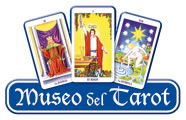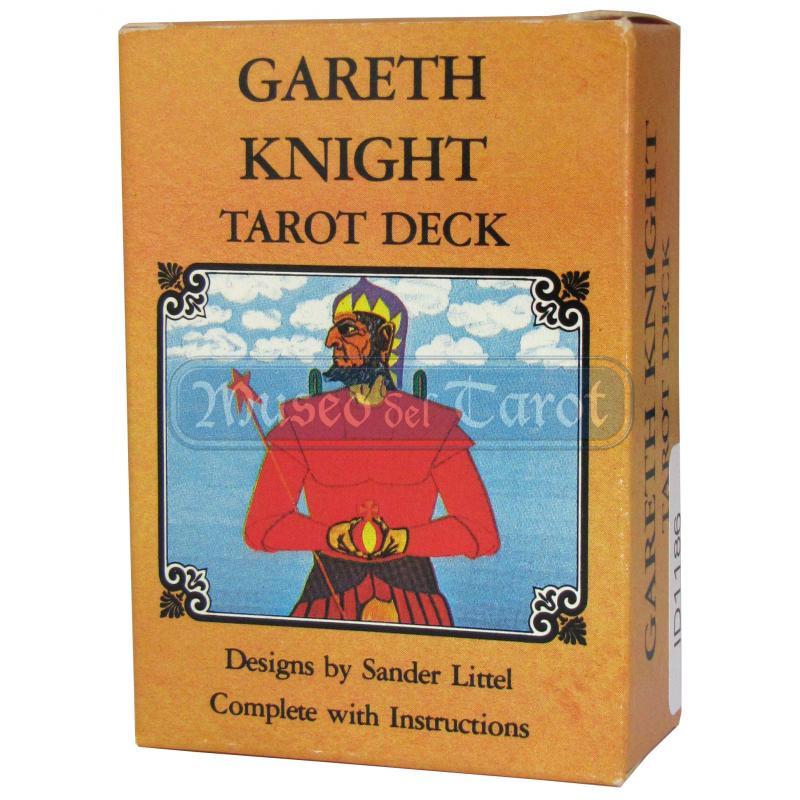The modernistic designs, created by Dutch artist Sander Littel under the direction of leading occultist Gareth Knight, illustrate the mystical principles of the Tarot. Booklet by Knight provides basic esoteric philosophy plus cartomancer's instructions.
The Gareth Knight Tarot is an esoteric deck published in 1984 and now out of print, with symbology that draws on a mix of traditions. The art is flatly coloured and harsh, with non-scenic minor arcana.
Artist, Gareth Knight
Coartist, Sander Littel
Distributor U. S. Games Systems 1984
Creator(s): Gareth Knight, Sander Littel 1984, reprint 1985
Country: USA Publisher: US Games / ASS
Number of Cards: 78+3
Reference: Encyclopedia of Tarot, vol. III, pp. 595, 600-601
El hermoso y raro Tarot de Gareth Knight fue concebido en 1963 por el ocultista británico Gareth Knight y el astrólogo y artista abstracto alemán Sander Littel. Esta colaboración se prolongó durante varios años. La baraja se imprimió en Alemania (Alemania Occidental) para los Juegos de EE. UU. en 1984. El Gareth Knight Tarot está OOP (agotado) y tiene una simbología que se basa en una mezcla de tradiciones. El arte es de colores planos y ásperos, con arcanos menores no escénicos.
Esta edición se imprimió en la década de 1980 en Alemania Occidental y viene en una caja de plástico, a diferencia de las barajas vendidas en EE. UU. que tienen una caja naranja. La cubierta nunca se ha utilizado y todavía está sellada. Las fotos para el listado fueron tomadas con otra baraja idéntica. La baraja sigue el patrón del Tarot de Thoth (de Aleister Crowley) y se completa con 78 cartas (22 Arcanos Mayores y 56 Arcanos Menores). Las cartas miden 6,99 cm x 9,53 cm. Es una baraja muy simbólica, ricamente ilustrada y coloreada, creada por dos grandes nombres del ocultismo europeo.
The Gareth Knight Tarot is the work of the leading occultist Gareth Knight (pseud. Basil Wilby, England 1930 and member of the Fraternity of Inner Light, related to the Golden Dawn), and the Dutch artist Sander Littel (Zwijndrecht 1939), who united their understanding and talents to create a tarot deck of great artistic and esoteric value.
In 1963 Knight and Little met in the artist’s studio, the corner of a 500-year old warehouse high above the streets of Dordrecht, NL. Together they planned the rough designs of the deck, exchanging ideas and information on both art and the occult. Little researched kabbalistic literature suggested by Knight, while Knight gathered inspiration from old tarot designs in antiquarian bookshops, public museums and libraries.
During the next year, Knight sent little sketches of tarot designs scribbled with notes on the esoteric meaning of the cards. Little would respond with his own sketches, incorporating Knight’s ideas and adding questions of his own. Finally, a design would be completed to the satisfaction of both.
Through the combined efforts of Llewellyn Publications and U.S. Games Systems, Inc., the cards are now available to occultists and tarot collectors.
The cards are printed by Altenburger and Stralsunder Spielkarten in Germany, the box and booklet are printed in the USA.
The cards show resemblance to the cards of the Golden Dawn deck by Robert Wang. T






